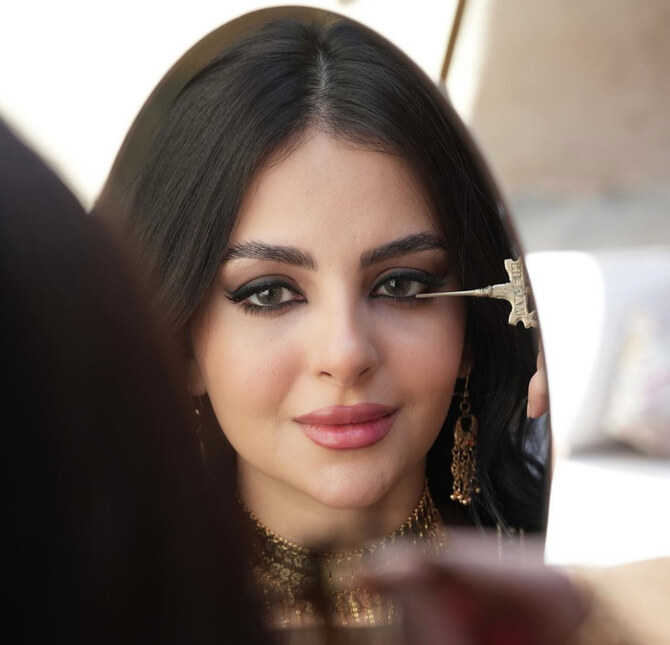RIYADH: The resurgence of ithmid in the Saudi market among the youth has sparked interest and discussion in recent months.
Ithmid, also known as kohl, is a type of eye cosmetic that has been used in cultures the world over. It is made of ultra-fine and homogenized powder containing a mixture of minerals or elements.
Ithmid has a long history of use in the Arabian Peninsula and other parts of the Middle East. But for Muslims it holds special significance because it was used by the Prophet Muhammad for its benefits to eye health.

Ithmid, also known as kohl, is a type of eye cosmetic that has been used in cultures the world over. It is made of ultra-fine and homogenized powder containing a mixture of minerals or elements. (Supplied)
Many young people are embracing this ancient tradition as a way to connect with their heritage and express their cultural identity.
In addition to its cultural significance, the revival of ithmid can also be attributed to its perceived health benefits.
Owners of the Athmad19 Instagram store told Arab News: “Prophet Muhammad recommended its use for many reasons, mainly its many benefits for improving eye health and for cosmetics.”

Studies found that authentic ithmid can have benefits, such as reducing eye irritation and improving vision. (Supplied)
The owners said that they were inspired to create their business because of the lack of authentic ithmid kohl.
“We strive to revive the Sunnah of the Prophet, peace and blessings be upon him, and remind people of the benefits of ithmid kohl,” they said.
Ophthalmologists and scientists have conducted studies on the efficacy and safety of ithmid for use around the eyes. These studies found that authentic ithmid can have benefits, such as reducing eye irritation and improving vision.
According to the World Health Organization, Andalib et al. carried out research to inform frequent users of ithmid about its toxic and beneficial effects.
The study’s results demonstrate the chemical makeup of ithmid and its safe use as a cosmetic and therapeutic product for maintaining the health of human eyes, with no adverse outcomes.
One of the primary benefits of ithmid kohl is its antibacterial effect. Studies have shown that ithmid can inhibit the growth of harmful bacteria, making it an effective treatment for eye infections such as conjunctivitis.
Bushra Al-Saeed, 25, discovered the healing powers of ithmid kohl for her persistent pink eye, or conjunctivitis.
“My eye doctor prescribed me antibiotics for recurring pink eye, but to no avail,” she said.
Then her grandmother told her to try the traditional remedy of ithmid kohl. “To my surprise, my eye quickly began to heal and my lashes grew darker and thicker,” Al-Saeed said.
The solution not only cured her pink eye but also opened her eyes to the wonders of natural remedies.
A study by Hasson et al. showed the successful treatment of bacterial endophthalmitis using ithmid, claiming it as “an innovative approach that has shown promise and may potentially serve as a viable alternative in clinical practice.”
Ithmid is also known for its cooling and soothing effect on the eyes. Its natural ingredients help reduce inflammation and redness, providing relief to those suffering from eye discomfort. This makes it a popular choice for people who spend long hours in front of screens or under harsh lighting.
To reap the benefits, Athmad19 owners said that it is important to be able to identify authentic ithmid from fake products that claim to be pure ithmid.
“Fake ithmid causes itching and redness continues, and this is a sure factor that the kohl is fake and contains high levels of lead, iron or glass.”
They said that their ithmid is sourced from a guaranteed supplier, which they carefully study.
There are several methods used to ensure its authenticity, such as the magnet experiment.
“When the ithmid kohl sticks to the magnet, it is conclusive evidence that the kohl is not original and contains iron filings,” they said.
Some ithmid retailers incorrectly claim that if the product sticks to the magnet, it is evidence that the kohl contains beneficial minerals.
“This is just a promotional method and has nothing to do with the originality of the ithmid kohl at all because beneficial minerals are not attracted to the magnet.”
Another method of finding out if the ithmid is original is to check for its shine. The owners of Athmad19 said: “If the ithmid kohl powder is highly reflective, then that means that it is fake, because ithmid loses its shine after being ground into powder.”
They also said that people purchasing ithmid should buy it from a seller who can show the stone being ground into powder.
Overall, studies show that ithmid is a safe and natural alternative to modern eye treatments that may contain harsh chemicals. Its long-standing use in traditional medicine globally highlights its efficacy and safety, giving consumers peace of mind when using it for eye care.




























